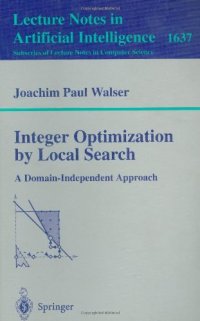
Ebook: Integer Optimization by Local Search: A Domain-Independent Approach
- Genre: Mathematics // Optimization. Operations Research
- Tags: Artificial Intelligence (incl. Robotics), Algorithm Analysis and Problem Complexity, Discrete Mathematics in Computer Science, Business Information Systems, Calculus of Variations and Optimal Control, Optimization
- Series: Lecture Notes in Computer Science 1637 : Lecture Notes in Artificial Intelligence
- Year: 1999
- Publisher: Springer-Verlag Berlin Heidelberg
- City: Berlin; New York
- Edition: 1
- Language: English
- pdf
Integer Optimization addresses a wide spectrum of practically important optimization problems and represents a major challenge for algorithmics. The goal of integer optimization is to solve a system of constraints and optimization criteria over discrete variables.
Integer Optimization by Local Search introduces a new approach to domain-independent integer optimization, which, unlike traditional strategies, is based on local search. It develops the central concepts and strategies of integer local search and describes possible combinations with classical methods from linear programming. The surprising effectiveness of the approach is demonstrated in a variety of case studies on large-scale, realistic problems, including production planning, timetabling, radar surveillance, and sports scheduling. The monograph is written for practitioners and researchers from artificial intelligence and operations research.
Integer Optimization addresses a wide spectrum of practically important optimization problems and represents a major challenge for algorithmics. The goal of integer optimization is to solve a system of constraints and optimization criteria over discrete variables. Integer Optimization by Local Search introduces a new approach to domain-independent integer optimization, which, unlike traditional strategies, is based on local search. It develops the central concepts and strategies of integer local search and describes possible combinations with classical methods from linear programming. The surprising effectiveness of the approach is demonstrated in a variety of case studies on large-scale, realistic problems, including production planning, timetabling, radar surveillance, and sports scheduling. The monograph is written for practitioners and researchers from artificial intelligence and operations research.